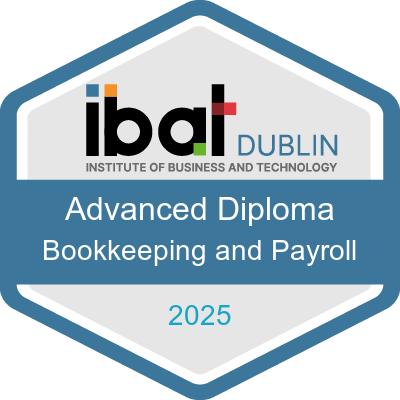- Why Advanced Bookkeeping and Payroll?
- Course Overview
- Course Content
- Career Opportunities
- Entry Requirements
Why Advanced Bookkeeping and Payroll?
This course is intended for those who are interested in building on the principles of bookkeeping and accounting, to be able to carry out a practical range of bookkeeping and management accounting procedures, using the most popular bookkeeping and payroll software package (Sage).
Course Overview
The Advanced Diploma in Bookkeeping and Payroll will build on your current knowledge, providing you with a more advanced level of computerised bookkeeping and payroll. You will be able to work with account adjustments and journals and prepare management accounts. The course will also give you a good foundation to progress to advanced professional accountancy courses such as the ACCA.
Bookkeeping and payroll courses are especially useful for those who have already completed a professional accountancy programme and would like to gain a more advanced working knowledge of Sage.
Within the advanced payroll section, you will learn how to calculate holiday pay and redundancy payments and complete month-end and year-end procedures to Revenue. The course will significantly develop your working knowledge of payroll, allowing you to complete more advanced tasks and work unassisted in a payroll environment.
What is a Professional Diploma?
An IBAT Professional Diploma is a focused, short duration practical course that consolidates, upskills and/or reskills learners in a professional area. They are stand-alone qualifications that do not lead to an award on the National Framework of Qualifications (NFQ).
Course Content
Bookkeeping Module Overview
The Bookkeeping module aims to equip you with the knowledge, skill, and competence necessary to carry out everyday operational accounts activities using a commercial computerised accounts solution, Sage 50 (one of the leading accounts software applications used in business today).
It will enable you to carry out a range of accounting procedures. This section of the programme covers subjects including double-entry bookkeeping, the set-up and data preparation requirements, processing adjustments, entering and extracting accounts information for all ledgers and journals, using the Journal to correct errors and record year-end adjustments, calculating ratios, completing budgets/forecasts, and the production of various financial reports for management purposes, using Sage 50 Accounts.
On completion of this section of the programme you should be able to:
- Set up master data from a Trial Balance on a computerised accounts software package and in the preparation of financial statements
- Be able to carry out Enter opening balances for Customers, Suppliers, and Nominal Ledgers
- Be competent in a range of accounting procedures, process adjustments, and journals and set up recurring journals and payments
- Understand accruals and prepayments, capitalise a fixed asset, understand depreciation of a fixed asset, reconcile bank accounts, and be fully competent in month-end procedures and reporting
- Select and print accounting reports for management and decision-making purposes
- Manage the software system and understand the importance of backing up and restoring data.
Payroll Module Overview
This advanced bookkeeping course will enable you to carry out a range of payroll procedures and manage a payroll system. You will learn how to interpret the main provision of a range of legislation and regulations relating to work time. You will also learn how to analyse a range of documentation an employee may receive from Revenue and be able to complete all appropriate employer tax return forms.
Learn how to process payroll for employees, calculate overtime, holidays, and benefit-in-kind, redundancy payments, holiday pay, and statutory and non-statutory deductions.
On completion of this section of the programme you should be able to:
- Manage a payroll system, understand data protection, understand the importance of backing up and managing files
- Calculate mileage and expenses, benefit-in-kind, and notional pay
- Understand the benefit of Tax Saves, bike-to-work schemes and travel pass
- Be able to calculate holiday pay and entitlements for full-time and part-time workers
- Understand the depreciation of a fixed asset
- Be able to calculate redundancy payments
- Calculate month-end procedures and become familiar with e-banking
Assessment
You will be assessed by an online two-hour exam at the end of each module. To be awarded a Diploma in Advanced Bookkeeping and Payroll, you will have to pass each module.
Career Opportunities
Possible bookkeeping jobs after completing this programme:
- Accounts Payable/Receivable
- Benefits and Payroll Manager
- Bookkeeper (with Accounting Technician/Accounts Administrator/Office Manager)
- Credit Controller
- Finance Assistant
- Payroll and Bookkeeping Clerk
- Payroll Manager/Specialist
Entry Requirements
This course is suitable if you already have a current working knowledge of Computerised Accounting and Payroll Systems, or if you have previously completed the Diploma in Bookkeeping and Payroll course at IBAT Dublin, or an introductory bookkeeping and payroll course with another provider.
Please note: Visas are not offered for any of our diploma courses.
Why Study at IBAT Dublin?
We are Ireland’s leading enterprise-focused third level institution with a special focus on how we guide, support, and mentor our students throughout their college experience and into their working lives.
We know that employers need graduates that can hit the ground running, so we’ve tailored our courses to prepare you to do just that. And if you need an extra hand, our Academic team equipped with years of lecturing and industry experience are ready to support you both in your professional and personal development.
Diverse Programmes
Take your pick of our wide range of courses, each designed with your future in mind.
Expert Tutors
Learn from industry professionals at the very top of their game.
Flexible Learning
Life happens. We get it. Study and achieve your goals on your schedule.
Central Location
Study at one of our two campuses placed in the heart of central Dublin.
Small Class Sizes
Get one-to-one, personalised support from our tutors.

Meet Our Students
Hear from our students as they share why they chose IBAT Dublin and the invaluable benefits they’ve gained from their journey with us.
Study options
You can attend lectures Online or On Campus, offering maximum flexibility with your time and how you learn.









